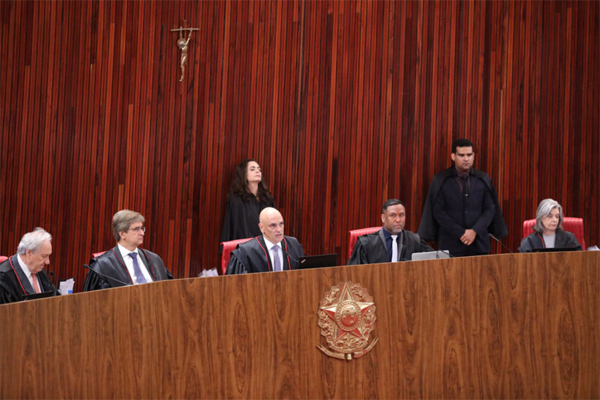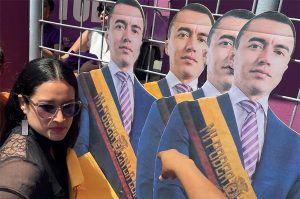
Brazilian electoral court chief rejected a challenge to Brazil’s Oct. 30 presidential runoff, yesterday. President Jair Bolsonaro’s Liberal Party had sought to overturn his loss, arguing that a software bug should invalidate a significant percentage of votes. (See yesterday’s post.)
Independent experts said the bug had no impact on the integrity of the vote.
Justice Alexandre de Moraes described the challenge as “offensive” to democratic norms, adding that it sought to encourage criminal and anti-democratic movements, reports Reuters.
He dismissed the complaint after giving Bolsonaro’s coalition 24 hours to explain why it had only questioned votes from the election’s second round, in which Bolsonaro lost, and not the first round, in which his political party won the most seats in Congress using the same voting machines, reports the New York Times.
De Moraes also fined the parties in Bolsonaro’s coalition $4.27 million, for what the court described as bad faith litigation, reports the Associated Press.
Many analysts said Bolsonaro’s allies likely expected the challenge to fail in court, but instead intended it to fan a protest movement that seeks to overturn the election. Similarities to the U.S. 2020 election are lost on nobody: members of Bolsonaro’s inner circle are meeting with advisers to former president Donald Trump to discuss next steps, reports the Washington Post. Brazilian congressman Eduardo Bolsonaro, the president’s son, has met Trump at Mar-a-Lago since the election, and spoken to strategist Stephen Bannon by phone.
More Brazil
- Brazil plays its first World Cup match today — but even the country’s soccer fanaticism has been tainted by it’s ultrapolarized politics this year. The national team’s jersey, the canarinho, was coopted by Bolsonaro and supporters, tainting the national symbol for his opponents, reports the Washington Post.
- Advisers to Brazilian president-elect Luiz Inácio Lula da Silva are discussing a more moderate spending plan after last week’s budget proposal sent local markets plunging, reports Bloomberg.
Regional Relations
- The U.S. contemplating using penalties such as Magnitsky sanctions to tackle climate change more aggressively, reports Reuters. The move, which could target criminals driving deforestation in Brazil’s Amazon, would be a major shift in Washington’s strategy to combat global warming.
- Cuban President Miguel Díaz-Canel met with his Russian counterpart Vladimir Putin in Moscow, Tuesday. They unveiled a monument Fidel Castro and hailed the “traditional friendship” between their nations, reports the Associated Press.
- The Pacific Alliance leaders meeting scheduled for this week in Mexico City will be held in Lima instead, after Peruvian President Pedro Castillo was blocked from traveling by his country’s Congress, reports Reuters.
- Canadian sanctions against high-level Haitian politicians show Canada’s government “is not as committed to Haiti’s ruling party as the Haitian opposition has claimed,” reports CBC.
- The U.S. government announced that it will detain all imports of sugar and related products made in the Dominican Republic by Central Romana Corporation, Ltd. amid allegations that it uses forced labor. (Associated Press)
Migration
- The United States is in talks with Mexico and other countries to facilitate the return of Venezuelan migrants to their home country, a plan that would likely involve deporting Venezuelans to a third country and flying them back to Venezuela from there, reports Reuters.
Mexico
- Mexico City’s homicide rate is far below that of many U.S. cities — murders have plummeted in recent years, and the capital never suffered from the worst narco warfare that ravaged much of the country, writes Ioan Grillo in his blog.
Argentina
- Former Argentine presidents Mauricio Macri and Cristina Fernández de Kirchner appear to be flirting with running in next year’s presidential election — if they do, it will polarize the electorate and eclipse more moderate candidates, reports the Financial Times.
El Salvador
- El Salvador’s executive sent a digital-securities bill to lawmakers. The proposal aims to raise $1 billion via the world’s first sovereign blockchain bond, reports Bloomberg.
Histories
- Student archaeologists rediscovered a 1,000-year-old mural, the Huaca Pintada, in northern Peru. The 30-meter-long wall painted with multicolored fantastical images was first found by grave robbers a century ago, but the site later fell into obscurity, reports the Guardian.
- A 1527 document signed by the conquistador Hernán Cortés, stolen from Mexico’s national archive 30 years ago, will be returned home after turning up in a U.S. auction. (New York Times)
- “An extensive cache of Aztec ritual offerings found underneath downtown Mexico City, off the steps of what would have been the empire’s holiest shrine, provides new insight into pre-Hispanic religious rites and political propaganda,” reports Reuters.
Happy Thanksgiving!
Jordana Timerman / Latin America Daily Briefing
http://latinamericadailybriefing.blogspot












